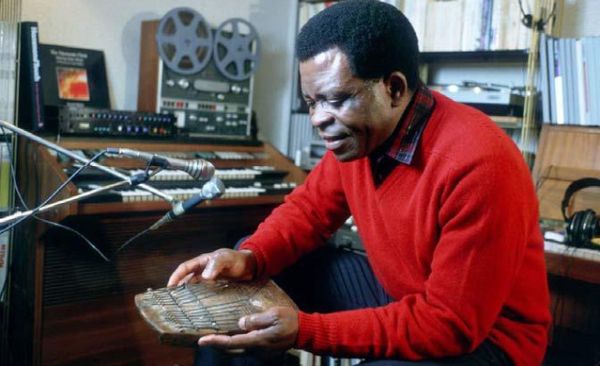

Francis Bebey
Trésor Magnétique continues to show how far outside of any existing sub-Saharan African styles Bebey worked. Perhaps the closet comparison is William Onyeabor’s often lo-fi synthesized grooves. But Onyeabor didn’t demonstrate anywhere near the range Bebey does. For example, “Je Vous Aime Zaime Zaime”, a nearly-annoyingly catchy pop song, rides a bed of synth and a frantic drum machine. “Agatha” comes off as some kind of disco/bikutsi hybrid driven by thick bass and slapped percussion. Compare it to the robotic, synth and guitar-directed version available on African Electronic for an example of how Bebey reshaped familiar themes, something he also does on an alternate version of the nearly-yodeled “Pygmy Love Song.”
Heavier experiments appear here as well. “Ganvié” uses flute and lots of echoed sanza to take listeners into deep musical jungles, while “Ndolo” multi-tracks Bebey’s voice over metallic percussion and a stuttering bass in a way that suggested the possibility that Cameroun was responsible for influencing the dance-based post-punk coming out of NYC and the UK at the time.
Bebey has said that “The artistic challenge is to use the tools of Western progress and [communicate] messages of the African heritage,” and every note here shows him doing that. At no point does any of this sound like the work of someone attempting to cross over into a western market so much as it demonstrates a visionary who was conscious of how important it was for western musical innovations, based on African poly-rhythms in the first place, to also be created in Africa. “Funk Maringa,” for example, is a futuristic Makossa that suggested another Cameroun, in the same way the Raincoats exhibited an alternative to whatever mainstream pop music trends were in early 80s UK. Along the way, Bebey developed groundbreaking work for sanza and at the same time crafted monster funk proto-rap for the club. To him, it was all connected. What he has in common with an artist like Sun Ra is that he had to pass away to allow the rest of us to catch up to him.
Further listening: And if you are curious about The Raincoats (the editor was), here's their album Odyshape
Search RootsWorld
|